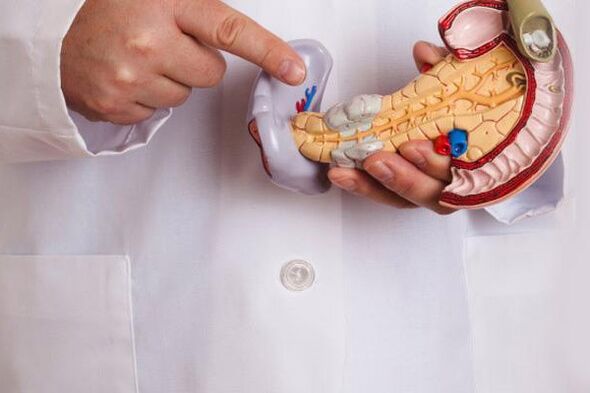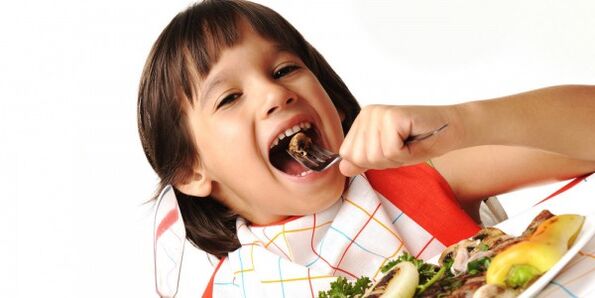Diet is a key factor in successful treatment for pancreatitis, so adherence to dietary restrictions allows you to live a full life and reduce the chances of relapse.
Pancreatitis is an inflammation of the tissues of the pancreas, accompanied by problems with the secretion of digestive enzymes, severe pain, changes in your stools and vomiting. This leads to abnormal metabolic disorders and can lead to the development of diabetes. The main causes of pancreatitis are overeating, fatty foods and alcohol abuse.
Prolonged diet for pancreatitis is required. In the case of acute inflammation, the diet should be limited to 6-9 months, while in the case of chronic pancreatitis, the diets are followed for several years or for life.
Power characteristics

Approaches to prescribing pancreatitis depend on whether the inflammation is acute or chronic. Doctors note the positive effects of diet on pancreatitis. This allows you to quickly overcome acute inflammation, avoid complications and prolong the remission period in the chronic process.
Dietary characteristics:
- Within 2-3 days after an acute attack of pancreatitis, you should completely give up food. Thus, the pancreas is provided with rest. Therapeutic fasting involves the use of liquid in the form of non-carbonated alkaline mineral water, infused tea or wild rose infusion, one glass 5-6 times a day.
- On the fourth day after the onset of therapeutic fasting, the gradual introduction of solid foods begins. These are usually low-calorie, salt-free meals that gradually increase the secretion of gastric juice.
- In the case of pancreatitis, the method of cooking is important. It is recommended to cook steam, because the food prepared in this way retains all the necessary substances and does not harm the digestive tract.
- Food should not be chilled or hot, the optimal temperature is close to body temperature. In this case, the food must be grated or semi-liquid.
- Diet in the case of pancreatitis limits even the consumption of dietary foods. They eat small portions at least five times a day.
The diet does not include foods:

- greasy;
- fried;
- hot sauces and condiments;
- sour juices;
- canned, pickled cucumbers;
- smoked meat;
- confectionery;
- cocoa, chocolate;
- alcohol.
The energy value of such food must be 2500 kcal.
The disadvantage of such a diet is the acute shortage of unprocessed plant foods. Some ingredients need to be compensated by taking complex vitamins and supplements.
Diet for the treatment of acute pancreatitis
Diet is an integral part of treatment for pancreatitis. During an exacerbation, the attack is accompanied by severe abdominal pain and loss of appetite, so the patient does not suffer during the first days of medical fasting.
In addition, low-calorie diets are gradually being included in the diet. It can be dried uncooked bread, berry drinks and jelly, viscous oatmeal and rice decoctions, liquid mashed potatoes without oil. It is recommended to exclude products that promote gas formation during this time.
On 6-7 days, protein dishes are gradually introduced: steamed meat, mashed potatoes or puddings from vegetables, steamed protein omelette.
It should be noted that diet requires long-term dietary restrictions. For 6-9 months, you must strictly follow its rules and monitor your diet daily.
The course of the disease may have certain characteristics, so a gastroenterologist and a nutritionist deal with the appointment of a diet. Specialists in this profile determine what can be eaten with a pancreatitis diet for each individual patient, taking into account co-morbidities.
After the acute period of the disease has subsided, you can significantly diversify your menu with simple and healthy products. It should be noted that the number of meals should be at least four, while the volume of liquid consumed is about 1. 5 liters per day.
Example menu:
- Breakfast: boiled semolina (rice) porridge; An Apple; poorly brewed green tea with one spoonful of honey.
- Second breakfast: steamed chicken breast meatballs; carrot puree; decoction of wild rose berries.
- Lunch: vegetable broth with beef or fish; mashed potatoes; white bread toast; baked apple without peel.
- Afternoon snacks: low-fat cottage cheese; green tea with a spoonful of honey.
- Dinner: steamed protein omelette from three chicken eggs; mashed potatoes from dietary vegetables; white bread toast.
- Before going to bed: sour milk.
With diet, the symptoms and treatment of pancreatitis are noticeably relieved. This diet protects the pancreas and gradually normalizes its function. The patient's well-being will depend on how strictly he or she follows the diet. Any eating disorder is immediately reflected in digestive function.
Diet for chronic pancreatitis
Chronic pancreatitis most often develops against the background of an acute condition, but can also occur as a primary disease in cases where it is a complication of other diseases.
Diet and treatment of pancreatitis are two inseparable concepts. Even during remission, dietary recommendations should be followed.
Dietary rules for chronic pancreatitis:
- The caloric content of food during this period should be commensurate with daily physical activity.
- Much attention is paid to the protein content of food. Turkey, chicken, rabbit, beef, lean pork and fish are allowed.
- Lamb, fatty pork, goose, duck and game are not allowed in the diet.
- Food heat treatment does not allow to bake, bake in the oven, stew. The food should be prepared in a double pot or cooked.
- Cheese, which was previously banned during the aggravation stage, is now allowed in small quantities, but it is preferable to replace it with fermented milk products.
- Dietary protein, which is represented by cereals and yesterday's bread, should be included in the diet, and legumes should be completely excluded from the diet with pancreatitis.
- The total amount of carbohydrates must not exceed 350 g per day. They are found in pasta, cereals, honey, canned food and syrups.
Approximate diet menu for chronic pancreatitis:
- Breakfast: boiled rabbit meat; rice porridge.
- Brunch: low-fat cottage cheese; apples fried without honey.
- Lunch: buckwheat soup; cooked or steamed fish with vegetables; dried fruit compote.
- Afternoon snacks: steamed meatballs with vegetable sauce.
- Dinner: veal, unsweetened cottage cheese pudding; weak tea.
- Before going to bed: kefir.
Meals are partial and in small portions. The food should be served warm at intervals of about three hours.
Salt and spices cause increased secretion of enzymes in the digestive tract, so their amount should be kept to a minimum. In addition, similar effects are seen in sour, smoked meals, pastries and sour cream, as well as in chocolate. Sugared foods can cause complications such as diabetes, so their content in the diet is reduced by 90%.














































































